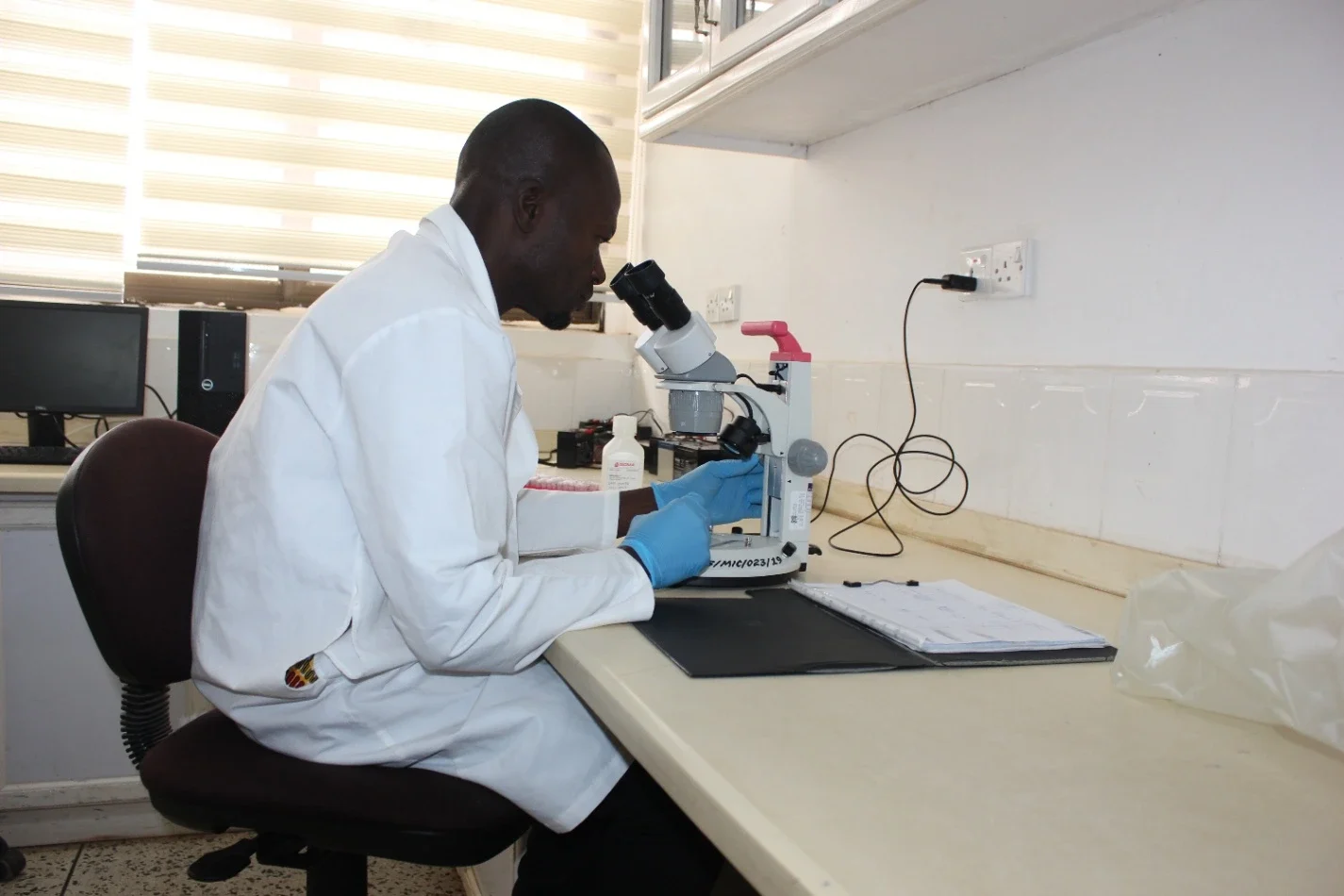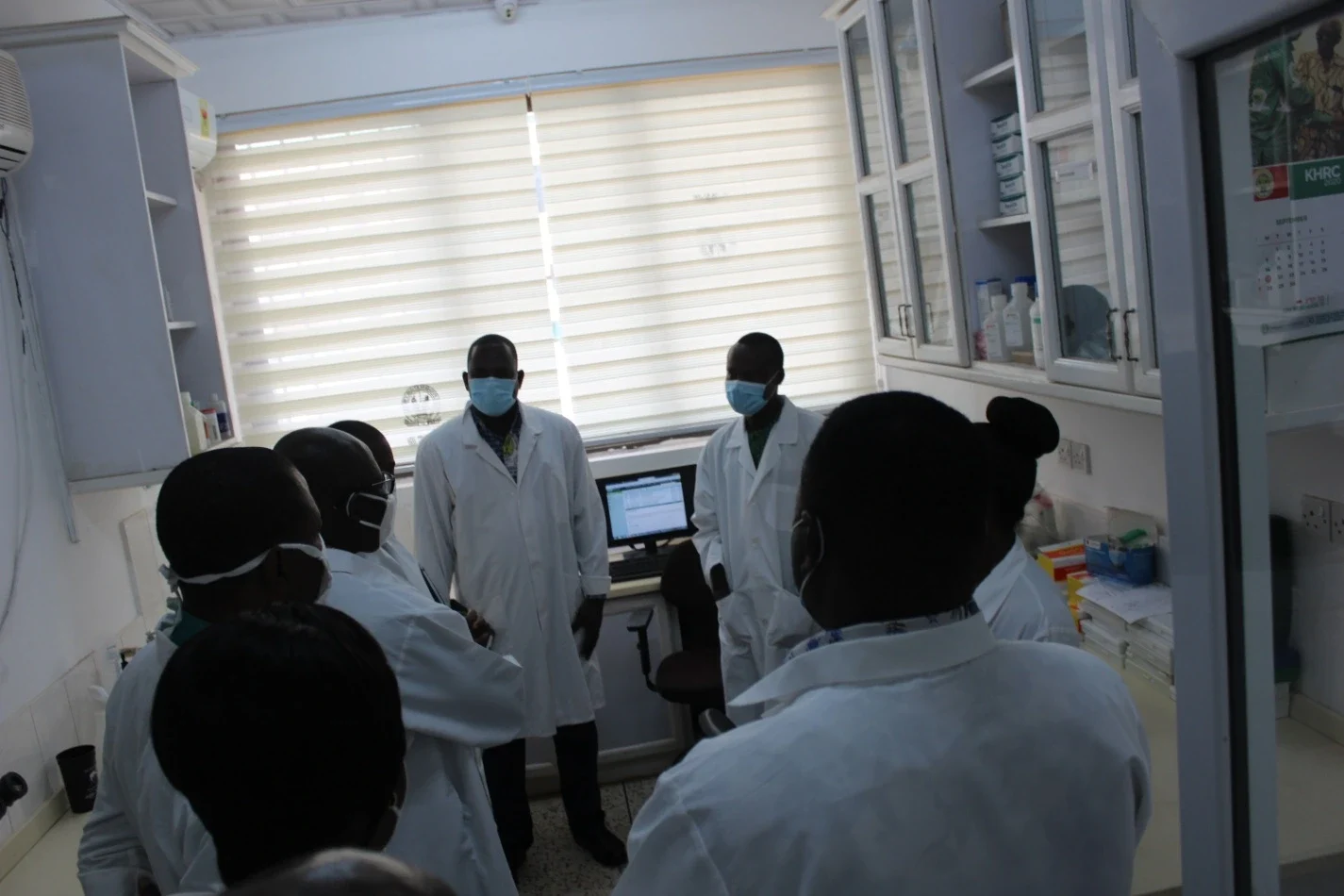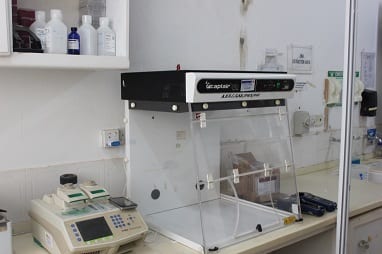SETH OWUSU-AGYEI MEDICAL LABORATORY
November 02, 2020 | Department | Reading time: 3 min
The Seth Owusu-Agyei Medical Laboratory (SOAML) generates quality laboratory results to support studies and research projects conducted at KHRC. The laboratory is made up of eight (8) specialized units, including Bacteriology, Clinical Chemistry, Entomology, Haematology, Immunology, Bio-Analytic (formerly Micronutrients), Molecular Biology, Virology, and Parasitology.
The SOAML has a team of 26 professionals, including 15 biomedical scientists, 7 medical laboratory technicians, and 4 laboratory assistants. It is equipped with advanced, state-of-the-art equipment to deliver high-quality testing and analysis of samples, to effectively support the diverse needs of the research Centre. The specific activities carried out by each unit are detailed below:
Bacteriology Unit:
The Bacteriology Unit is equipped with a class II biosafety cabinet which is the main workstation, a carbon dioxide (CO2) incubator, two BACTEC 9050 machines for blood cultures and an autoclave. Samples processed
include blood, cerebrospinal fluid (CSF), urine, nasopharyngeal swab, ear swab and stool. Culturing, identification and antimicrobial susceptibility testing are performed according to Clinical Laboratory Standard Institute (CLSI) guidelines.
To ensure that results generated from this unit are of high quality and are reliable, the unit participates in External Quality Assessments (EQAs) provided by the United Kingdom National External Quality Assessment Scheme (UK NEQAS). In addition to the participation in EQAs, daily, weekly and monthly internal quality controls on both equipment and reagents are performed to ensure they are all working effectively.

Clinical Chemistry Unit
This unit is equipped with a Horiba Medical Pentra C200 automated clinical chemistry analyzer to carry out analyses including liver function tests, kidney function tests, lipid profile, glucose and uric
acid. The equipment has the capacity to be programmed and used for quantitative estimation of other substances including G6PD activity, Urine protein and creatinine, etc. A stand-alone Electrolyte analyzer is also available for estimation
of sodium, potassium and chloride in serum and urine samples. In addition to internal quality control systems, the unit is enrolled onto the External Quality Assessment (EQA) schemes organized by the College of American Pathologists
(CAP).

Entomology Unit
The Entomology unit has played crucial roles in studies that collect insects of medical importance (such us mosquitoes and ticks) for speciation and classification as well as serological and molecular analysis.
This unit is equipped with an ELISA plate reader, an automated plate washer, and a Stereo Dissecting Microscope. The unit is currently building an insectary to support testing of the efficacy of insecticides and other interventions.
Haematology Unit
The Unit is equipped with two Sysmex XN-330 one XN-350 analyzers for performing full blood count (FBC) analysis. It also has a Coagulometer for performing coagulation testing. Other tests performed in the unit
include glucose-6-phosphate dehydrogenase (G6PD), blood grouping and haemoglobin genotyping. In addition to internal quality controls, the unit performs very well in EQAs organized by the CAP and UK NEQAS.
Immunology Unit
This unit has separate sections for cellular and humoral assays, with equipment such as a class II biosafety cabinet, refrigerated centrifuge and pipetting accessories. The unit is also equipped with a laminar
flow cabinet, a carbon dioxide incubator, -80oC and -150oC freezers and liquid nitrogen tanks. Currently, isolation and cryopreservation of peripheral blood mononuclear cells (PBMCs) is being done. The unit plans to introduce flow
cytometry, Luminex, and T-Cell ELISpot assays.
Molecular Biology Unit
The Molecular Biology unit has two real-time PCR machines (Applied biosystems 7500 Fast Real Time PCR and AGS PCR machine). The unit also has a Cepheid GeneXpert (provided by the Ghana Health Service)
for testing of tuberculosis (detection and drug resistance), trichomonas/Gonorrhoea, and COVID-19. The unit has also established protocols for bacterial and parasitological molecular analysis to enable the Centre to perform such analysis
at the SOAML. This step will minimize the shipment of samples to external laboratories for analysis.

Bio-Analytic (Micronutrient) Unit
The unit has a High-Performance Liquid Chromatography (HPLC) machine with auto-sampling, UV Scanning Spectrophotometer for testing haemoglobin variants, glycated haemoglobin and serum retinol.
The unit is also equipped with a Quansys machine to measure micronutrients, and a Zinc Protoporphyrin (ZPP) analyzer.
Parasitology Unit
This unit supports all studies that require malaria microscopy results and other blood borne infections. To ensure quality and accurate test results, each malaria blood smear is examined by two independent
certified microscopists while discordant slides are examined by a third microscopist. The unit has more than 10 microscopes. The unit participates in EQAs provided by CAP, Swiss Tropical and Public Health Institute, and IQLS.
Quality Assurance
The SOAML adheres to Good Clinical Laboratory (GCLP) and ISO 15189:2012 Standards. The Clinical Laboratory undergoes periodic assessments by study sponsors and regulatory inspections by the Foods and Drugs
Authority, Ghana.
Support Services
The Seth Owusu-Agyei Medical Laboratory offers technical support to laboratories across the Bono East Region. Specifically, the clinical laboratory has assisted the Kintampo Municipal Hospital, Kintampo South
District Hospital in Jema, Atebubu Municipal Hospital, St. Theresa's Hospital in Nkoranza, and Holy Family Hospital in Techiman in establishing and maintaining robust Quality Assurance systems. It facilitated the registration of the
Atebubu Municipal Hospital, Holy Family Hospital in Techiman, and Kintampo Municipal Hospital onto the UK NEQAS scheme for full blood count analysis.
The SOAML also supports the children’s ward at Kintampo Municipal Hospital by processing patient samples and provides testing assistance to health facilities within the Bono East Region during outbreaks of meningitis, typhoid, and cholera.
